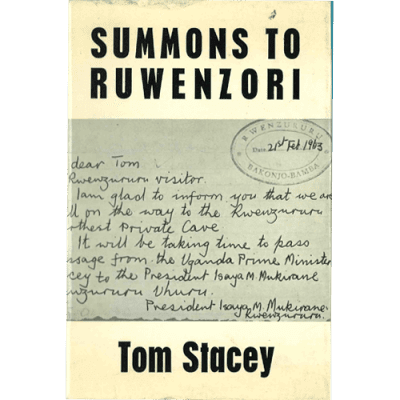
Published by Secker & Warburg, 1965
Hard Cover
ISBN: ASIN B003NXWRAC
Genre: Non-fiction
Out of print
Summons to Ruwenzori
This is the story of how one white man saved the soul and ensured the continued existence of an African tribe.
Ten years ago Tom Stacey made a long journey through the scarcely explored country of the Ruwenzori Mountains (better known as the Mountains of the Moon). The journey formed the background of his successful novel, The Brothers M. A leading character in the novel was a young native of the Bakonzo tribe, Isaya Mukirane. Eight years later Mr. Stacey was approached in London by the first High Commissioner of the now independent Uganda, himself a member of the same tribe; the Bakonzo were in revolt against the domination of the lowland Batoro, and the leader of the revolt was the same Isaya, who had fled to the mountains and proclaimed himself 'King' of the independent 'Kingdom' of Rwenzururu. The only man, white or black, the High Commissioner suggested, who would be allowed by Isaya's followers to reach him, was Stacey. The alternative was outright bloody warfare against a tribe fro whom the Central Uganda Government felt considerable sympathy. Would Stacey make the attempt?
Stacey is modest about what he achieved. But his story has epic qualities and is told by a man with rare insight into and the deep sympathy for the tribal life. He tells how, beset by much hardship and danger, he reached the mountain fastness of Kitote, to be greeted by old acquaintances who told him Isaya was no in the Congo on the other bank of the boundary river; of his first meeting with the friend he had loved; of his return to Entebbe (Uganda's capital) to work out a settlement acceptable to the Prime Minster; of the agonising wait to hear from Isaya that he accepted it, and then the stream of paranoiac messages, which convinced him Isaya had become insane. In a last attempt to make his old friend see reason Stacey climbed again into the mountains for a last dénouement with Isaya which proved as poignant as it was tragic.
And the end? It was hardly what Stacey had planned for Isaya. But he can claim indeed not only to have saved a tribe but to have deposed a king.
